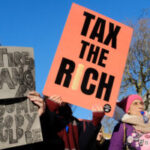British households face the worst drop in living standards in half a century as rising energy prices are set to push inflation to record highs.
Families in the UK are in line for a £1,000 hit to their take-home pay this year, according to a think tank.
This represents a 4 per cent drop in real income, which is the value of earnings after they are adjusted for the impact of inflation, and the steepest annual loss in spending power since the mid-1970s, the Resolution Foundation said in its annual report on the outlook for living standards.
Surging inflation, which could exceed 8 per cent in coming months, is expected to cause real take-home pay to fall by ten times the level it did in the aftermath of the 2008 financial crisis, according to the think tank.
Experts said that even before the war in Ukraine, the outlook for living standards was bleak. Soaring energy bills will hit low and middle-income families hardest when the energy price cap is lifted by 54 per cent next month.
Households should brace themselves for an even worse squeeze as the war in Ukraine persists, researchers said, as inflation could peak at 8.3 per cent this spring or even exceed 8.4 per cent, a level last recorded in April 1991.
The forecasts are significantly higher than those made by the Bank of England at the beginning of last month, before the war began. The Bank said then that inflation, which they expected to peak at 7.25 per cent next month, would cause real incomes to contract by 2 per cent this year. It would be the largest yearly drop in living standards since 1990, and five times the contraction recorded after the financial crisis.
The 4 per cent fall predicted by the think tank would be even larger without the government measures to offset the impact of the rise in energy prices this year. The government announced last month that in October it will give households a £200 rebate on their energy bills, though it is effectively a loan, as it will automatically be repaid over the next five years, with the first £40 taken off accounts next April.
Homes in council tax bands A to D will also be paid a £150 cash rebate in April that will not have to be repaid.
Researchers found that, without considerable improvement in the outlooks for productivity — which measures output per hour worked — and wage growth, the typical household income will be lower in 2025-6 than this year.
Households that rely on benefits will be particularly hard hit because benefit payments will rise next month in line with the consumer prices index last September, when the rate was 3.1 per cent, less than half the expected level next month.
The Resolution Foundation has called for the chancellor to increase benefit payments by a further five percentage points this April, amounting to a total rise of 8.1 per cent, balanced by a reduction in their increase by a similar amount the following year.
Adam Corlett, its principal economist, said household incomes would experience falls not seen outside recessions. “For millions of low and middle-income families, this inflation-driven squeeze will be made worse by a living-standards rollercoaster,” he said.
“Working-age benefits and the state pension are due to be uprated by just 3.1 per cent next month, at a time when inflation could be as high as 8 per cent. The immediate priority should be for the chancellor to revisit benefits uprating in his upcoming spring statement.”
He added: “In the longer term, turning around the UK’s relative decline compared to other advanced economies, and reversing our terrible recent record on productivity, is the only route to meeting the living- standards challenges Britain faces.”























0 Comments